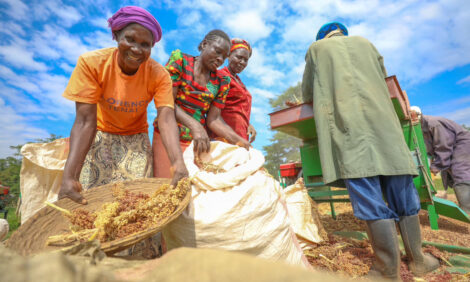



Iraq - Poultry and Products Report 2011
Iraq's domestic poultry production in 2011 is expected to decline from 2010 levels, as reduced feed availability, poultry disease issues and poor profitability have reduced domestic production prospects, according to the USDA Foreign Agricultural Service.Production
Iraqi poultry production in 2011 is expected to decline six per cent from the 2010 production level. Growth in the poultry sector was curtailed during the last half of 2010 by high feed prices and disease problems, both of which have carried over into 2011.
Poultry growers across central and southern areas have reported very high mortality rates and weak to negative returns since the fall 2010 production cycle. Hopefully, disease problems and associated losses represent a short-term set back, as producers move up the learning curve for intensive poultry operations. Production in 2011 is forecast to decline modestly based upon the reasons described above.
Only modest expansion of domestic poultry production is anticipated during 2012. Disease problems that have been particularly severe across central and southern areas of Iraq continue to affect domestic production negatively. Biosecurity and bio-safety protocols are not strictly adhered to by most producers, which makes it difficult to separate out disease problems from poor overall care and management by poultry producers.
Feed Availability
Domestic feed availability declined during 2011, as lower domestic feed wheat supplies and lower barley production limited supplies. While 2011 corn production will likely be above the 175,000 metric tons produced in 2010, it will not make up the shortfall of the other grains. Corn production in 2011 is forecast at 200,000 metric tons. Quality problems are pervasive in domestic corn; corn is harvested and shucked by hand, and then sold/delivered to Mesopotamia State Company for Seeds, part of the Iraqi Ministry of Agriculture, where it is shelled. Lack of shelling, storage and drying capacity leads to mould/fungus development and potential aflatoxin issues. Larger, integrated poultry operations have indicated that past experience with Iraqi corn was problematic and that they no longer use it despite its clear price advantage over imported corn.
Protein meal continues to be a major constraint, as Iraq produces only very limited quantities of oilseed crops. Sunflower and sesame production is strictly for confectionery and food uses, cotton production has rebounded in recent years. However, Iraq has no operational cottonseed processing facilities. Cottonseed is utilised whole, for domestic livestock feeding, and is also exported.
Imports of feed for the poultry sector remain constrained by cumbersome import requirements and seasonal import bans. Importers report that they are very reluctant to ship feed products to Iraq from neighbouring countries, due to the potential for costly border delays and corruption issues. End users have also seen sharply higher import procurement costs over the last 12 months as international prices rose sharply during mid-summer 2010. Imported feed costs within Iraq remain well above what might be expected assuming efficient market transactions, as traders/importers deal in relatively small quantities and rarely use bulk shipment. Corn, soybean meal and pelleted feed are generally shipped to Iraq in 50-kilogram bags. It is likely that US corn sold bulk to customers in Syria is being resold within Iraq.
The Ministry of Agriculture announced in the spring of 2010 that a poultry initiative was under consideration. The proposal/plan would entail the purchase of corn and soybean meal by the Ministry of Agriculture. The Ministry would then resell the imported feed products at subsidised prices, approximately 25 per cent under their procurement and handling cost. This initiative has been in the formative stage for over a year, and internal debates within the Ministry of Agriculture over which ‘State Company’ will be responsible to import and administer the programme have apparently been largely resolved. This initiative has the potential to impact corn and soybean meal imports substantially, as the funding level is reportedly $45 million dollars. The programme has been designed to function as revolving fund, with an annual supplemental requirement to compensate for the 25 per cent subsidy.
Ministry officials report that under the poultry initiative they will purchase 100,000 metric tons of poultry feed annually, with the initial purchase to be 25,000 metric tons of corn. This is to be followed by a purchase of second purchase that will include soybean meal. There is a downside to this initiative, since nascent private feed sector imports could be squeezed out, as importers would be unable to competing with subsidised imports. It may also be the case that the easing of feed import requirements and testing regimes could be further postponed by the entry of the Ministry of Agriculture as a feed supplier.
Senior Ministry of Agriculture officials have indicated that they will not import US corn, due to restrictions on imports of genetically modified (GM) organisms. It remains unclear if this restriction would also apply to products, such as US soybean meal. Realistically, the Ministry of Agriculture needs to understand better that lower cost imported feed products, along with better producer practices, is the avenue for growing the domestic poultry industry. Increased output produced at more competitive prices will create both additional economic activity and jobs in the still struggling agricultural sector.
Consumption
With both a drop in domestic production and imported supplies during 2011, per-capita consumption dropped for the second consecutive year. With expected population increases, maintaining per-capita consumption levels at the 2010 level will require an annual increase in poultry supplies of approximately 13,000 metric tons. Continued economic growth across Iraq should lead to gains in personal income, supporting poultry meat purchases by consumers. The outlook for continued high consumer prices in the red meat sector adds to a generally favorable outlook for both poultry production and imports.
Trade
In 2011, the decline in domestic poultry production/supply is being aggravated by new import regulations (see the Policy section below). Iraq instituted a pre-certification requirement on nearly all imported products on 1 July 2011. Imports of frozen poultry were particularly hard hit by problems with implementing this requirement. This has been reflected in sharply higher market prices for imported poultry products. Retail prices in Baghdad have risen 45 per cent since early July. While some of this is associated with the seasonal drop in domestic production, higher prices could encourage producers to expand production in the short term, if pre-certification enforcement continues to restrict poultry imports. Although complicated by the pre-certification requirement, imports of broiler meat should continue, due to its relative affordability relative to red meat prices and government concerns about food price increases.
Policy
On 1 July 2011, the Central Organization for Standardization and Quality Control (COSQC) of the Ministry of Planning implemented a new pre-certification requirement for most imported products, including processed food. The intent of this new requirement was to bring imports of sub-standard and unsafe products under control. Under this new requirement, COSQC contracted with two private sector companies, SGS and Bureau Veritas, to inspect and certify, in the country of origin prior to shipment, that products meet Iraqi import requirements. Products arriving at Iraqi ports of entry must now have a certificate of conformity issued by one of these two companies to enter the country.
Implementation of the new requirement resulted in turmoil at ports of entry in Iraq and badly disrupted imports of many products, including frozen poultry from the United States. Because of the turmoil after the 1 July implementation, the Prime Minister’s office declared suspension until 6 July, which helped calm the situation temporarily. In mid-August, the Iraqi Parliament stepped in to suspended pre-certification for a two-week period until 1 September. However, pre-certification is now back in effect and further suspensions seem less likely.
Pre-certification has still not been implemented in the Kurdish autonomous region in northern Iraq. However, COSQC in the Ministry of Planning in the Kurdish Regional Government has indicated that they will be moving forward soon to implement it there.
Further Reading
| - | You can view the full report by clicking here. |
November 2011








